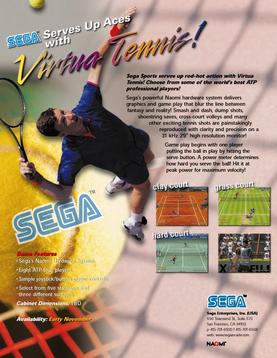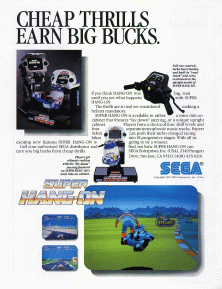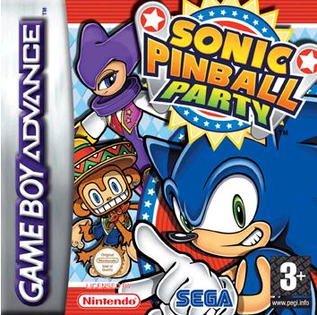
Treasure Co., Ltd. is a Japanese video game developer based in Tokyo known for its action, platform, and shoot 'em up games. The company was founded in 1992 by former Konami employees seeking to explore original game concepts and free themselves from Konami's reliance on sequels. Their first game, Gunstar Heroes (1993) on the Sega Genesis, was a critical success and established a creative and action-oriented design style that would continue to characterize their output. Treasure's philosophy in game development has always been to make games they enjoy, not necessarily those that have the greatest commercial viability.

Frogger is a 1981 arcade action game developed by Konami and manufactured by Sega. In North America, it was released by Sega/Gremlin. The object of the game is to direct a series of frogs to their homes by crossing a busy road and a hazardous river.

Virtua Tennis, known in Japan as Power Smash, is a 1999 tennis arcade game created by Sega AM3. The player competes through tennis tournaments in an arcade mode. It was ported to the Dreamcast in 2000, and to Windows in 2002. A Game Boy Advance version was also released in 2002, followed by an N-Gage version in 2003. For the home console market, the game was expanded with the introduction of the campaign mode.
In the history of video games, the sixth generation era is the era of computer and video games, video game consoles, and handheld gaming devices available at the turn of the 21st century, starting on November 27, 1998. Platforms in the sixth generation include consoles from four companies: the Sega Dreamcast (DC), Sony PlayStation 2 (PS2), Nintendo GameCube (GC), and Microsoft Xbox. This era began on November 27, 1998, with the Japanese release of the Dreamcast, which was joined by the PlayStation 2 on March 4, 2000, the GameCube on September 14, 2001 and the Xbox on November 15, 2001, respectively. In March 31, 2001, the Dreamcast was among the first to be discontinued. Xbox in 2006, GameCube in 2007 and PlayStation 2 was the last, in January 2013. Meanwhile, the seventh generation of consoles started on November 22, 2005, with the launch of the Xbox 360.

Space Harrier is a third-person arcade rail shooter game developed by Sega and released in 1985. It was originally conceived as a realistic military-themed game played in the third-person perspective and featuring a player-controlled fighter jet, but technical and memory restrictions resulted in Sega developer Yu Suzuki redesigning it around a jet-propelled human character in a fantasy setting. The arcade game is controlled by an analog flight stick while the deluxe arcade cabinet is a cockpit-style linear actuator motion simulator cabinet that pitches and rolls during play, for which it is referred as a taikan (体感) or "body sensation" arcade game in Japan.

Crazy Taxi is a series of racing games developed by Hitmaker and published by Sega. It was first available as an arcade video game in 1999, then released for the Dreamcast console in 2000. It is the third best-selling Dreamcast game in the United States, selling over a million copies. The game was later ported to the PlayStation 2, GameCube, and IBM PC compatibles with sequels also appearing on the Xbox, Game Boy Advance, and PlayStation Portable systems.

Super Hang-On is a motorcycle racing arcade video game released by Sega as the sequel to Hang-On. It uses a simulated motorcycle arcade cabinet, like the original game. An updated version was released in arcades 1991 as Limited Edition Hang-On.

Hudson's Adventure Island, known as Takahashi Meijin no Bōken Jima in Japan and also known as Adventure Island, is a side-scrolling platform game produced by Hudson Soft that was released in Japan for the Famicom and MSX on September 12, 1986. Adventure Island was released in North America for the Nintendo Entertainment System in 1988 and in the PAL region in 1992.

Astro Boy: Omega Factor is a beat 'em up video game developed by Treasure and Hitmaker, and published by Sega. The game was released for the Game Boy Advance on December 18, 2003 in Japan; August 18, 2004 in North America; and February 18, 2005 in Europe. The game is based on Osamu Tezuka's manga and anime franchise Astro Boy. However, it also features characters and plotlines from the artist's entire canon of work.

Allister Brimble is a British video game composer. He began composing music and sound effects for the video game industry in the mid-1980s. He also produced various audio tracks, as "Brimble's Beats", that were distributed on cover disks of magazines including CU Amiga and Amiga Format.

Sonic Pinball Party is a video game released for the Game Boy Advance in 2003. It is a celebration of sorts for Sonic Team featuring many references to its previous games, mostly prominently Sonic the Hedgehog, Nights into Dreams, and Samba De Amigo. There was also a release on a Twin Pack cartridge bundled with Sonic Battle and Sonic Advance respectively in 2005.

Phantasy Star Collection is a compilation of the Phantasy Star video games. When released for the Sega Saturn in Japan in 1998, it featured the first four games in the series, whereas the Game Boy Advance version, released four years later in North America and five in Europe, features the first three. The North American and European versions were produced by Digital Eclipse. The Saturn version was later ported to the PlayStation 2 in Japan with more games added.

Tose Co., Ltd. is a Japanese video game development company based in Kyoto. It is mostly known for developing Nintendo's Game & Watch Gallery series, various Dragon Ball games, as well as other Nintendo products. Tose has developed or co-developed over 1,000 games since the company's inception in 1979, but is virtually never credited in the games themselves. Tose maintains a policy of having no creative input into the work they do, going so far as to refuse to put their names in the credits for most of the games they work on. As such, Tose has gained a reputation for being a "ghost developer".

Sega AM Research & Development No. 1 is a development department within Japanese video game developer Sega that also previously existed as Wow Entertainment and Sega Wow Inc. AM1 spent most of its early existence under the leadership of Rikiya Nakagawa and developed a number of arcade games for Sega.
Puyo Puyo (ぷよぷよ), previously known as Puyo Pop outside Japan, is a series of tile-matching video games created by Compile. Sega has owned the franchise since 1998, with games after 2001 being developed by Sonic Team. Puyo Puyo was created as a spin-off franchise to Madō Monogatari, a series of first-person dungeon crawler role-playing games by Compile from which the Puyo Puyo characters originated. The series has sold over 9 million copies, including the Madō Monogatari games.

Sega Corporation is a Japanese multinational video game and entertainment company headquartered in Shinagawa, Tokyo. Its international branches, Sega of America and Sega Europe, are headquartered in Irvine, California and London, respectively. Its division for the development of both arcade games and home video games, Sega Games, has existed in its current state since 2020; from 2015 to that point, the two had made up separate entities known as Sega Games and Sega Interactive Co., Ltd. Sega is a subsidiary of Sega Sammy Holdings. From 1983 until 2001, Sega also developed video game consoles.














